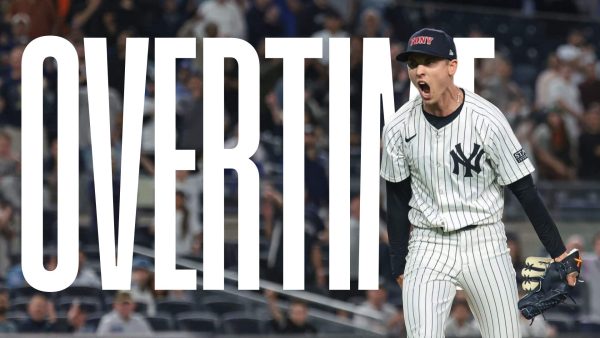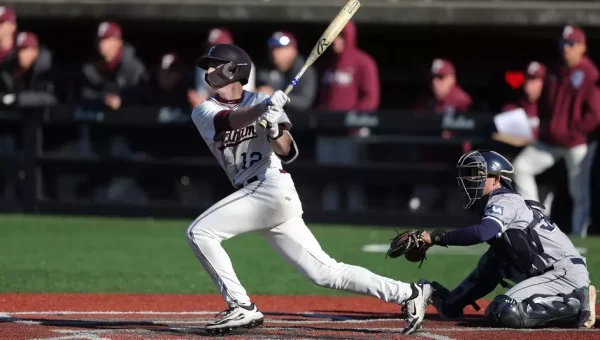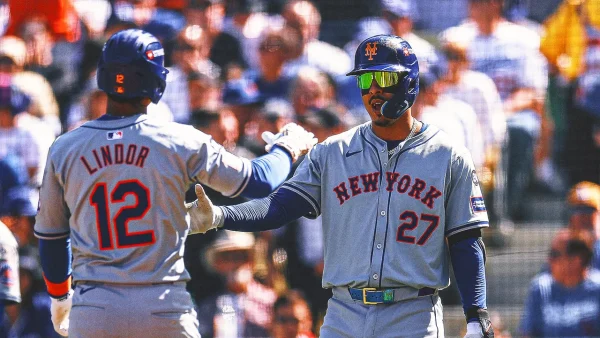Buster Posey Retires — Is He a Hall of Famer?
Buster Posey announced his surprise retirement from the MLB earlier this month, and while some may say his career was cut short, he was one of the best catchers to ever play the game of baseball, and that’s Hall of Fame worthy.
Posey delivered many iconic moments throughout his Giants career, whether or not it ends in the Hall of Fame. (Courtesy of Twitter)
October 11, 2012. Game five of the National League Division Series between the San Francisco Giants and the Cincinnati Reds. Up steps Buster Posey with the bases loaded. The 25-year old has recorded one of the greatest seasons of all time by a catcher in just his third full season. Later that year, he would become just the 16th catcher to win MVP since the award’s debut in 1931.
Awards don’t mean much at this moment though — it’s a win or go-home game. Posey rises to the occasion, delivering a monstrous blast into the upper deck of Great American Ball Park. The grand slam caps off a six run Giants inning and sends San Francisco onto the next round. Just three weeks later, the Giants enter Game four of the World Series with a 3–0 series lead, yet find themselves trailing 2–1 to the Detroit Tigers.
Once again, Buster Posey steps to the plate, this time with only one runner aboard. Posey pulls a pitch from Max Scherzer down the left field line for a two run home run, giving the Giants the lead. The Giants defeated the Tigers in 10 innings, clinching the four game sweep as they won their second World Series title in three years.
San Francisco Giants fans will never forget Posey’s historic 2012 season. After hitting a league-best .336 with a .957 OPS, Posey carried his MVP production into the postseason, capping off a career year with his second World series title. Buster Posey’s career is filled with unforgettable moments and impressive stats. Unfortunately, that career just came to an end.
Buster Posey announced his retirement on November 4, sending shockwaves through the MLB community. After sitting out 2020 due to health precautions following a couple of subpar seasons, Posey roared back in 2021, leading all catchers in WAR. The Giants rode Posey’s comeback to a league best 107 wins before being eliminated by the Dodgers in Game five of the NLDS. Still, the city of San Francisco was abuzz with hope and excitement. The Giants’ success was unexpected and Posey’s sudden resurgence was reminiscent of his prime in which he was consistently one of baseball’s best catchers. Now, Posey’s retirement adds a bittersweet element to the end of the 2021 season.
The 34-year-old Posey elected to go out on top, citing pain as a primary factor in the decision. “Physically it’s much harder now. And to be honest, it’s hard to enjoy it as much when there’s the physical pain that you’re dealing with on a daily basis,” he said in his November 4 retirement press conference.
Posey infamously suffered a season-ending ankle injury in 2011 on a home plate collision that led the MLB to alter its rules and severely limit when runners could collide with the catcher soon after. He dealt with recurring ankle and hip injuries for the remainder of his career. Mike Krukow reported that Posey was spending two hours in the training room before games and Posey himself said “it was just getting to the point where things that I was enjoying were not as joyful anymore.”
Posey retires with an impressive resumè despite his relatively short career. In 12 MLB seasons, all with the San Francisco Giants, Posey was a seven time All-Star and five time Silver Slugger. He has an MVP, Rookie of the Year, Gold Glove and MLB Batting Title to his name.
It is no exaggeration to say that Buster Posey was the best catcher of his generation. After bursting onto the scene in 2010 in his Rookie of the Year campaign, Posey consistently dominated the position until 2017. His impressive run is tough to beat, with Yadier Molina and Salvador Perez being the only other catchers remotely close to Posey’s production during that span. Despite his dominance, Posey’s unexpected retirement leaves his Hall of Fame case muddled.
Taking a look at his final stats, Buster Posey is a bit of a mixed bag. His .302 career batting average and .831 career OPS are both exceptional, but his cumulative stats are naturally less impressive. Posey has only six seasons with 140+ games played. He has an even 1500 hits, 158 home runs and a career WAR of 44.9. None of those stats pop off the page, and even looking at him through the catchers’ lense, who are not known for offensive production, it’s still borderline at best.
Posey ranks 34th in hits and 40th in home runs among catchers historically, placing him well below the top Hall of Famers at the position. That being said, hits and home runs are being valued less and less by Hall of Fame voters as more accurate analytical stats emerge. Posey’s Wins Above Replacement ranks 16th, just behind Thurman Munson and just ahead of Bill Freehan, Jorge Posada, Yadier Molina and Roy Campanella. Out of that group, only Campanella is in the Hall of Fame. Posada failed to receive the necessary 5% of votes in his first year on the Hall of Fame ballot and was removed. Molina is still playing, but his Hall of Fame case is by no means a lock.
The most apt and interesting comparison is to former Yankees catcher Thurman Munson. Munson’s career was cut short by a tragic plane crash that resulted in his death. Playing in just 11 seasons, his career accolades are oddly similar to Posey’s. Munson won Rookie of the Year and was a seven time All-Star and one-time MVP. He has two World Series titles to Posey’s three and has two more Gold Gloves than Posey.
The debate over Munson’s Hall of Fame case is one of the most controversial in baseball. Now off the ballot, his supporters claim that Munson’s stretch as one of the best catchers in baseball is enough to earn him the Hall of Fame nod, while the other side argues that his cumulative stats are simply not enough to get him in.
JAWS (Jaffe Wins Above Replacement Score) is a system created to evaluate a player’s worthiness for enshrinement in the Hall of Fame. Buster Posey has a 40.7 JAWS, putting him 14th amongst all catchers. While substantially behind the likes of no doubters like Johnny Bench, Posey ranks ahead of several Hall of Famers, including Campanella, Buck Ewing and Roger Breshanan. Those names might not be the most well known but bolster his case that he ranks above more than a few catchers already in Cooperstown.
Ultimately, the Posey argument is a uniquely interesting case. His stats alone are probably not enough to warrant enshrinement due to the length of his playing career. However, there’s something to be said for the impact he had on the game when he was playing. Buster Posey was clearly the league’s best catcher for a significant chunk of the 2010s. His average WAR over 162 games is 5.3, placing him ahead of most Hall of Fame catchers, including Mike Piazza, Yogi Berra and Carlton Fisk.
He had a marked impact on the game, both offensively and defensively. Posey caught three no-hitters, tied for third most in MLB history. He was at the core of a San Francisco team that won three World Series in six years. Posey was not only one of the best players at a position that has been characterized by low offensive production, but one of the best hitters in the league as well.
He is by no means a lock for the Hall of Fame. He is probably not a first ballot Hall of Famer. You can argue that his career was too short. You can argue that his cumulative stats should keep him out of Cooperstown. But you can’t argue this: he was one of the best catchers to ever play the game of baseball. In my book, that’s Hall of Fame worthy.

Lou Orlando is a junior from Brooklyn, N. Y. majoring in journalism. He joined the Ram as a freshman, writing articles for the sports section. Lou is thrilled...












































































































































































































